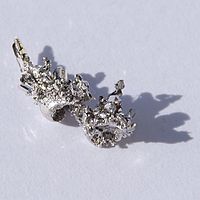
Photo from wikipedia
Abstract Nickel(II) and palladium(II) triphenylphosphine complexes incorporating tridentate Schiff bases have been prepared and characterized by elemental analysis as well as by spectroscopic techniques (FTIR & NMR). The synthesized compounds… Click to show full abstract
Abstract Nickel(II) and palladium(II) triphenylphosphine complexes incorporating tridentate Schiff bases have been prepared and characterized by elemental analysis as well as by spectroscopic techniques (FTIR & NMR). The synthesized compounds were assessed to check their potential biocidal activity by using different biological assays (brine shrimp cytotoxicity, antimicrobial, antioxidant, antitumor and drug-DNA interaction). Results of brine shrimp cytotoxicity assay showed that ligand molecules are more bioactive than metal complexes with LD 50 as low as 12.4 μg/mL. The prominent antitumor activity was shown by nickel complexes while the palladium complexes exhibited moderate activity. The synthesized compounds have shown high propensity for DNA binding either through intercalation or groove binding which represents the mechanism of antitumor effect of these compounds. Additionally, ligand molecules and nickel metal complexes showed significant antioxidant activity with IC 50 values as low as 3.1 μg/mL and 18.9 μg/mL respectively while palladium complexes exhibited moderate activity. Moreover, in antimicrobial assays H 2 L 1 , Ni(L 1 )PPh 3 and H 2 L 3 showed dual inhibition against bacterial and fungal strains while for the rest of the compounds varying degree of activity was recorded against different strains. Overall comparison of results suggests that the synthesized compounds can be promising candidate for drug formulation and development.
Journal Title: Journal of Molecular Structure
Year Published: 2017
Link to full text (if available)
Share on Social Media: Sign Up to like & get
recommendations!